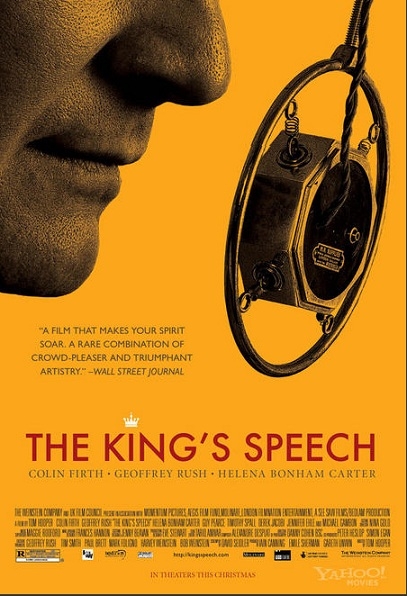The King's Speech: "Talk" Therapy In the Movies
I saw The King's Speech a few weeks ago. It's a touching, witty and well-told story about Prince Albert, who unexpectedly became King George VI after his older brother abdicated. The Prince had a serious stutter, which kept him from making the morale-boosting speeches that his country's citizens so desperately needed.
Aside from being a compelling story, it also features a compassionate therapist, Lionel Logue, helping the prince overcome his stutter.
It reminded me of another war movie about PTSD-related speech impediments, Behind the Lines. In that movie, the compassionate and revolutionary therapist was Dr. William Rivers.
While the majority of movies about therapy tend to focus on the client experience, these two films look more closely at the therapist. In these films we see a solid representation of the ideal therapeutic relationship.
The King's Speech and Behind the Lines feature:
- Real stories about people and events that actually existed
- Eccentric, cutting-edge - but passionately compassionate - therapists
- Wealthy, well-mannered clients accustomed to special treatment
- Special attention to the incredible amount of mental and physical effort a therapist puts in to provide quality treatment to their patient
Wouldn't you feel motivated to do your best work every day if your clients presented:
- A life-defining challenge that mattered on a deep personal level to the client
- A chance to practice cutting-edge therapies that might be too outlandish for timid clients
- A circumstance where national self-esteem hangs in the balance and only therapy can save the day
- Powerful determination despite many personal roadblocks that make the client reluctant to try
- Deep pockets to pay the bills and a solid education that makes the client capable of understanding your treatments
Now that's a dreamy client. As a therapist your work would see results that reach the client on a personal level and impact the world as well. The value of your therapy would be immediately obvious to both the client and those who surround them.
I think passionate compassion is one quality that makes an excellent therapist stand out from the competition. What therapist doesn't want to feel proud that their work has made a difference? What client doesn't need that level of support?
(Unfortunately, compassion hasn't always been the order of the day. Some poor children wound up in "The Monster Study," the University of Iowa's 1939 controversial stuttering experiment.)
Your Turn: Tell us about your dream client - what would your ideal client/therapist relationship look like?




Comments
Heather
Feb 28, 2011
Permalink
I think Colin Firth's character in the movie would have been a really difficult client, actually: he's tried every therapy under the sun, all of which have failed, has zero faith that you can help him, and is unwilling to adhere to aspects of the work that you feel are essential to its success. What I loved about the film was how Geoffrey (sp?) Rush's character handled those challenges: I loved how confident he was in his methods, and his unwillingness to compromise on the integrity of the treatment. It was such a great portrayal of how to handle a challenging situation like that. I don't know what my ideal client would be, but I'd love to emulate a bit of what Lionell Logue was modelling in the movie; I was just so impressed by him.
leigh
Feb 28, 2011
Permalink
Spot on again Heather, I suppose he would have been rather difficult, maybe I'd was projecting my silly admiration for Colin Firth onto the king! (As an aside, I wonder what it would have been like to treat Austen's Mr. Darcy? -- bit of a narcissist there.)
And yes, Logue was 100% present as a therapist in the movie -- that kind of confidence and professional stamina is amazing :)
Heather
Mar 4, 2011
Permalink
Wow. I just had a look at the 'Monster Study'; we've certainly come a long way in terms of ethical research, hey? Scary.
James
Mar 8, 2011
Permalink
I wondered about how Prince Albert's therapist could be potentially over dramatized so as to give people the wrong impression about how impactful a therapist can be. Do you think the movie might have skewed people's perception?
Heather
Mar 10, 2011
Permalink
I definitely think the relationship portrayed bewteen the Prince and his therapist was unusual; they ended up being a lot more intertwined than is standard, I think. At the same time everything I've read about what makes therapy effective says that the most important factor is the strength of the relationship between the therapist and client, so I don't think therapy can ever be effective if you don't respect the therapist or feel connected to them, like they 'get' you. I've heard a lot of people compare finding a therapist to finding a hairdresser- that after certain basics are met, it's totally subjective. In that sense it might be pretty hard to generalize, but I used to have a supervisor who used to say that if someone's problems/issues stem from relationships with people (and whose don't), that the healing is best coming from a relationship as well. That's one theory, anyway.
leigh
Mar 11, 2011
Permalink
I do see it as an inspirational fantasy piece on one hand-- Kind of a "someday my prince will come" story for therapists. But as Heather pointed out the prince/king was far from co-operative at the start -- that's what gives it the flavor of real therapy -- all that friction and resistance.
Many clients will not face the immediate threat of public humiliation if they do not work out their issues -- occasional humiliation? perhaps. But the ongoing threat of humiliation the scale that the king faced? not so much -- So the "typical" clients motivation to get better just isn't there. Much of the therapist's time is spent identifying strategies to get break past crafty client defense mechanisims.
That's part of the allure of the self-pay client -- self pay typically means the client is a "type A" achiever, CEO, a doctor, a lawyer or has public face to maintain -- the motivation to tackle issues before the cracks start to show is front and center. Motivation -- it's what therapists want.
So yes James, I think you're right - the quality of the relationship between Logue and the King was unusual. Here is an account of a former client of Logue who said he was very kind but that his stuttering did not improve remarkably under him.
http://www.stammering.org/logue.html
Denise Stein
Mar 22, 2011
Permalink
Wow, now I know which movies get moved to the top of the Redbox list of "want to watch" for me! Thanks. As for the ideal client/therapist relationship? I think Heather had the best analogy - like your hairdresser/barber - another provider of personal service, one might note. A 'professional' friend. If both the client and the therapist have the same vision of what that looks like - that's your dream scenario right there.